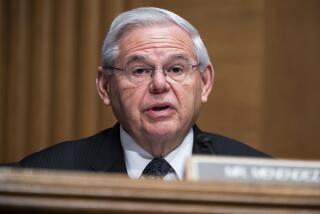Hussein Trial Urged Over Oil Damage
- Share via
DHAHRAN, Saudi Arabia — After touring Kuwait’s flaming oil fields, several U.S. senators urged Sunday that Iraqi President Saddam Hussein be put on trial for crimes against the environment.
At least one lawmaker, stunned by the devastation, said he would have no qualms about having Hussein executed for having fouled the skies with burning oil.
“I would put him to death,” said Sen. Joseph I. Lieberman (D-Conn.). “I would impose capital punishment without hesitation.”
He noted that there is “substantial sentiment” in Congress to create “some kind of treaty or convention that would make clear that vindictive assaults on the environment like this would be punished--and punished severely.”
Lieberman, a member of the Senate Environment and Public Works Committee, was among 17 senators who stopped briefly here at a Saudi air base after glimpsing war damage in Kuwait and meeting with U.S. military officials.
“Every one of us was moved and depressed by the spectacle of those fires,” said Sen. John Kerry (D-Mass.), who suggested that the damage done to the environment constitutes “a new category of war crime.”
Sen. John H. Chafee (R-R.I.) said he came away from Kuwait “with a loathing for Saddam Hussein. The destruction that he wrought to Kuwait and to the environment . . . makes one think that he is a totally evil person, and I hope he does not survive.”
Chafee, however, said he does not advocate that the United States become directly involved in seeking the Iraqi dictator’s ouster.
The senators said they were told by Gen. H. Norman Schwarzkopf, commander of U.S. forces in the Persian Gulf, that troops will begin to be rotated out of Kuwait for fear that long-term exposure to oil smoke could damage their health.
However, spokesmen for the U.S. Central Command in Riyadh, Saudi Arabia, said Schwarzkopf apparently has yet to issue specific orders outlining which troops will be rotated and when.
More than 500 wells set ablaze by retreating Iraqi soldiers continue to burn in Kuwait, casting a gloomy, acrid pall over much of the tiny nation while prompting some military personnel to complain of headaches and congestion.
Experts from the U.S. Environmental Protection Agency, the Centers for Disease Control in Atlanta and the National Oceanic and Atmospheric Administration are in Kuwait to gauge what effect the smoke is having on people as well as the planet.
“There apparently is no immediate danger” to soldiers stationed in Kuwait, Lieberman said, “but nobody really knows what the effect will be over the long term.”
Oil-well firefighters have estimated that it may take as long as three years to extinguish all the fires.
In addition to setting fire to oil wells, Iraqi forces are suspected of having opened pipeline taps through which about 2 million barrels of oil, about 84 million gallons, flowed into the northern Persian Gulf.
Meanwhile, U.S. Atty. Gen. Dick Thornburgh, appearing Sunday on NBC’s “Meet the Press,” would not comment when asked if the Justice Department is assembling a file to possibly prosecute Hussein for any alleged war crimes.
WHAT’S A WAR CRIME?* Murder, ill treatment or deportation of the civilian population of an occupied territory.
* Murder or ill treatment of prisoners of war or persons on the seas.
* Killing of hostages.
* Plunder of public or private property, wanton destruction of cities, towns or villages or devastation not justified by military necessity.
* Crimes against humanity such as extermination, enslavement and other inhumane acts committed against any civilian population either before or during a war, or persecutions on political, racial or religious grounds.
More to Read
Sign up for Essential California
The most important California stories and recommendations in your inbox every morning.
You may occasionally receive promotional content from the Los Angeles Times.










